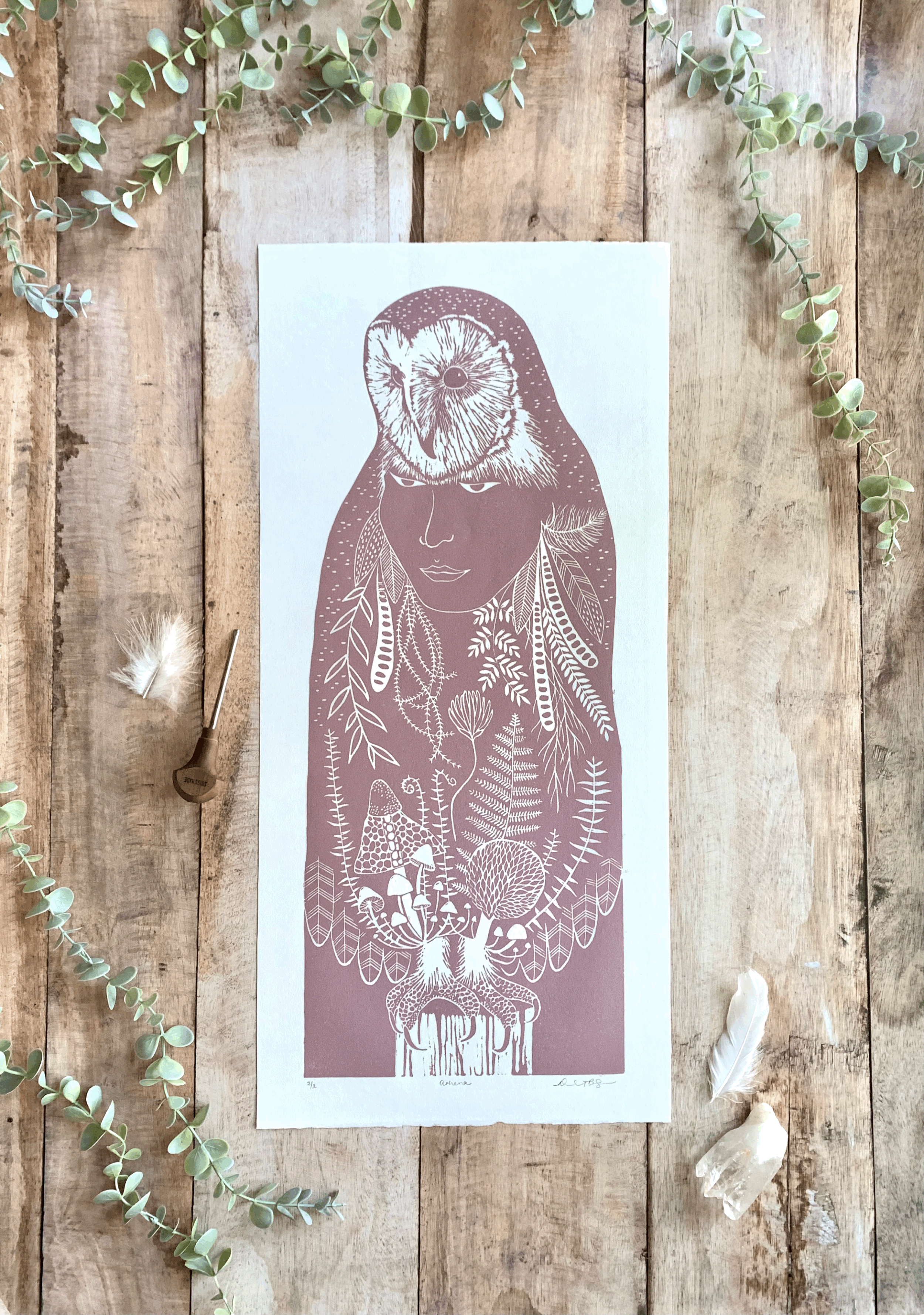What sacred knowing might we remember if the human mind dared to meet the wild gaze of nature, not in conquest, but in kinship? In the old mythic grove of Greece, a little owl comes to roost upon Athena’s blind side — not as ornament, but as oracle — and together they become the enduring symbol of divine wisdom through their shared kinship with each other. That owl, it is said, was once Nyctimene, a young princess who fled into the forest cloaked in silence and shame, after suffering unspeakable harm at the hands of her own father. In that liminal woodland, where grief and wildness intertwine, Athena found her. The goddess did not turn away. She offered refuge, tenderness, and transformation — shaping Nyctimene into her spirit companion, a daemon of night vision and quiet power. Thus, the owl became an eternal emblem of wisdom not born of books, but of brokenness transformed — a sacred knowing that can only be born when darkness turns to light.
The myth of Athena is a story that takes place in a forest and is a story of spiritual transformation: Nyctimene changes into an owl, and Athena into a goddess who can see the whole Truth. Nyctimene is lifted out of her place of shame and fear, and is honored and recognized for her ability to see in the dark. In the case of Athena, it is because of her companionship with an owl, who sits on her blind side, that she is able to see the whole truth, and become the Goddess of Wisdom.
This myth speaks to the understanding that wisdom is not a singular view: it is born from dual sight, from the intertwining of perspectives, of standing between two worlds and knowing both. Perhaps it also beckons us to see that wisdom arises not from isolation but from the union between human and more-than-human realms. It calls us to realize that wisdom is more than the sum of its parts... that deep insight, clarity, and discernment come when we open ourselves to listen to all voices, from many vantage points, and let them guide us toward understanding.
Forests, in the tapestry of folktales, are often depicted as liminal spaces, thresholds of transformation where one can emerge reborn, holding new awareness, wisdom, or a different place in the social world. Many cultures revere the solitary time spent in the wild as a sacred opportunity for dreamwork, wandering with purpose, and rites of passage, all leading to profound self-discovery.
Owls are, similarly, often associated with twilight, that intermediary time between daytime and nighttime, when they are out hunting. Creatures and places that occupy intermediary, liminal places and times are imbued with power, enchantment and mystery. Owls are also solitary and independent creatures and although they may find a mate, they do not follow a herd or group, further supporting the idea that discovering the Truth or gaining Wisdom requires a certain degree of separation from the flock. It is a resulting skill that comes when one is not swayed by the herd, but in the forest away from the crowds, where one is encouraged to think and survive on one’s own terms.
From a gendered lens, it is striking that Athena, in the aftermath of Nyctimene’s trauma, chooses to elevate the maiden to such a revered stature. In a world where the pain of women is often minimized or shamed, Athena does not diminish Nyctimene for her suffering. Instead, she raises her to a place of power and reverence, transforming her into the all-seeing owl of wisdom. Athena is a protector of those who have suffered, and through their pain, they may unlock the deep well of wisdom that dwells within. This myth speaks to a profound truth: that wisdom often arises from the places of deepest pain and darkness, and that it is through embracing the whole of ourselves — light and shadow — that we discover the richness of our knowing.
Athena, known as “Minerva” in Roman tradition, carries a name steeped in ancient history. Minerva’s roots trace back to the Etruscan goddess Menrva, a deity whose lineage reflects the deep interconnections of diverse peoples and cultures. The Etruscans, thought to be of African descent, predate both the Romans and Greeks, and their influence on Roman culture was profound, shaping the city of Rome into a vibrant, multicultural center. The name Minerva itself is derived from a much older deity, Meneswā or Menes-wo, meaning "she who remembers," “she who knows,” or "she who measures." Minerva’s name shares roots with the Hindu goddess Manasvini, a symbol of virtue, intelligence, and lunar power. Athena, then, is not merely one goddess but a cultural synthesis, an amalgamation of diverse traditions, blending the wisdom of many lands, and from this fertile place of both-and, the Goddess of Wisdom is born.
As we contemplate the myth of Athena and her owl, we are invited to ponder the very essence of wisdom. What does it mean when wisdom flows not from a single stream, but from the confluence of many rivers, from the intertwining of multiple perspectives? How do we learn to embrace a knowing that is both rational and intuitive, visible and hidden, logical and mysterious? What happens when we allow ourselves to hear not just the dominant voice, but the chorus of many voices, from the earth, from the silent ones, from those who see the world with different eyes?
In a world where divisions run deep and the noise of discord grows louder, the call to wisdom has never been more urgent. If we cling to one narrow view — whether it be born of reason, tradition, or our own limited experience — how can we ever hope to grasp the complexity of the world we inhabit? But if we are brave enough to wander into the spaces where different truths collide, to hear the stories that are often overlooked, to honor the wisdom that flows from the wild and the forgotten, we open ourselves to the possibility of a new vision, one that sees beyond the horizon of our present limitations.
Perhaps this myth, with its themes of transformation and union, carries with it an ancient truth: that true wisdom is not a destination, but a journey, one that requires us to be in constant dialogue with the world, to embrace the tension between opposites, to hold the space where contradictions meet. In our fractured world, this kind of wisdom is the balm we need. It asks us to honor all the voices that have been silenced, to learn from the cycles of the earth, and to recognize that wisdom is not something we possess, but something we are constantly becoming.
When we choose to look at the world through both eyes — the eye of logic and the eye of mystery, the eye of humanity and the eye of the wild — we align ourselves with the sacred dance of the Divine Feminine, whose wisdom flows not in straight lines, but in endless, interconnected circles, guiding us back to the wholeness we have long forgotten.
Note* I created this piece with a barn owl as inspiration before I learned that the owl that is associated with Athena is actually a Little Owl, Athene Noctua!
References:
Apel, Thomas (April 8, 2022). “Roman Goddess Minerva”. The World Encyclopedia of Mythology. Mythopedia.com.
Cartwright, Mark (January 7, 2014). “Minerva”. World History Encyclopedia. Worldhistory.org.
Harris, Karen “Etruscans History: The First Romans Were Actually Black People” Historydaily.org








In the deep memory of our Earth, as the year turns, we witness the sun returning, brightened by the quiet tending of Earth’s creaturely beings. Across traditions, both ancient and living, these sun animals chase the sun, free it, temper its heat, and watch over it with attentive, nurturing care until dawn hatches. Within the spell of these stories, we begin to feel like we are living within a relational universe—awake, watchful, alive, and attuned. And with this sense of belonging, the stories can open a quiet space where the edges of a once indifferent world soften, and trust quietly unfurls, allowing wonder to rise as we follow the sun on its journey across the sky.